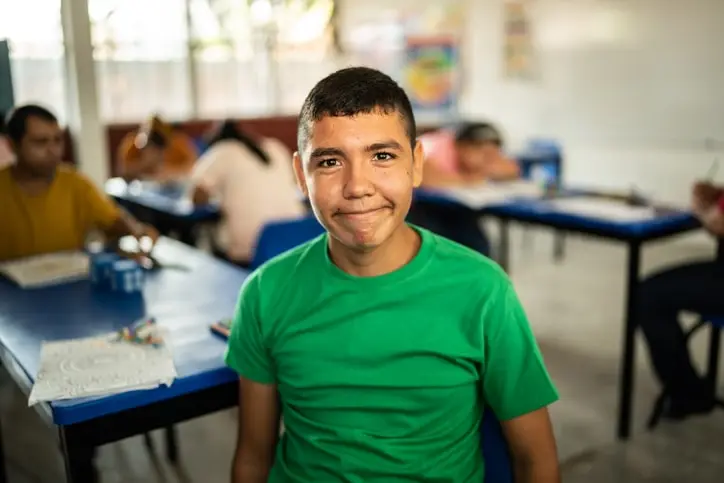Role of NDIS in providing autism support
The ndis support offered to those with autism varies but funding is given in order to help them reach their full goals and develop their capacity to participate in the community.
What is autism?
The ndis support offered to those with autism varies but funding is given in order to help them reach their full goals and develop their capacity to participate in the community.
This condition is a lifelong disability that affects different people in different ways. That’s why it’s described as a ‘spectrum disorder’.
People with autism can also experience a range of different health conditions including:
-
- Intellectual disability
- Epilepsy
- Gastro-intestinal issues
- ADHD (attention deficit hyperactivity disorder)
Dyspraxia (a brain-based motor disorder that affects fine and gross motor skills) - Anxiety
How common is autism?
It’s estimated that around 1 in 70 people are on the autism spectrum with males four times as likely to have autism than females. It’s most commonly identified in children and young people with around 83% of those with autism aged under 25 years.
How does autism affect people?
People with autism have challenges in two main areas. These are:
-
- Social communication and interaction
- Restricted or repetitive behaviours, interests and activities, which include sensory processing difficulties.
Difficulties with communication can manifest in many ways. Some people may never develop language while others may have good language skills. Some people may misunderstand words, interpret them literally or not understand them at all. Some may have trouble constructing meaningful sentences due to difficulties using appropriate grammar and vocabulary.
People with autism also have difficulty with social communication and as a result their social skills may be poor. This may translate into them not being able to make eye-contact with people, appearing as ‘aloof’ or uninterested and unsure of themselves. People with autism often have trouble establishing and maintaining friendships and therefore end up becoming withdrawn and isolated.
Some people with autism are unable to live on their own or maintain steady employment.
How does autism affect families?
Having a child with autism can be very challenging for families. The need to care for someone can take its toll financially, especially if one parent is unable to work due to their caring responsibilities. It can also create a great deal of emotional stress in other family members and it’s common for people to have poor relationships with other siblings and extended family members. Research has also found that parents of children with ASD have a higher divorce rate than parents who don’t have a child with a developmental disability.
People with autism and their families often need support.
What support is available for people with autism?
The Australian Government funds the costs associated with having a disability through the National Disability Insurance Scheme (NDIS). These funds enable people with disabilities and their families to have the supports they need.
Funding is given to eligible individuals to help them live to their full potential. Funding is based on individual needs to help people:
-
- Pursue their goals
- Increase their independence
- Improve their social and economic participation
- Develop their capacity to take part in the community.
As autism is a permanent disability, the NDIS provides funding for people with the condition. In fact, ASD is the largest primary disability category for the NDIS with 29% of participants having an approved plan for a primary disability of autism.

At Independence Australia, we are dedicated to offering a comprehensive range of NDIS support services, designed to cater to the unique needs of NDIS participants in Victoria. Dive in to discover how we can guide you throughout your NDIS journey to help achieve your goals.
What will NDIS fund for autism?
The NDIS funds “reasonable and necessary” supports to help people achieve their goals. For people with autism, this may include:
-
- Information or emotional support
- Referral to other services like community health, playgroups or support groups
- Speech therapy
- Occupational therapy
- Physiotherapy
- Nutritional services to diversify eating habits
- Personal care support (help showering, toileting, dressing, eating)
Behavioural support (relationship building, behavioural management techniques) - Respite services to support families and carers.
The amount of funding and support for autism depends on the severity of the condition.
How can you access NDIS autism funding?
To access NDIS funding you need to complete an Access Request Form.
-
- To seek support for children 0-7 years, you need to contact an Early Childhood Early Intervention (ECEI) Partner.
- People over the age of 7 years of age will access NDIS funding by contacting a Local Area Coordinator (LAC).
Once your eligibility has been confirmed, the person seeking support (and their carer if appropriate) will have a planning meeting to discuss goals and the level of support required. Then a plan will be developed to enable you to access the funding to purchase the relevant supports and services that match your needs.
Further information about the NDIS, eligibility, accessing funds and managing your plan can be found at the NDIS website or at Independence Australia’s own navigate-the-ndis page
